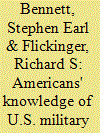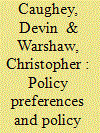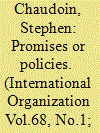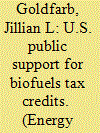|
|
|
Sort Order |
|
|
|
Items / Page
|
|
|
|
|
|
|
| Srl | Item |
| 1 |
ID:
086662


|
|
|
|
|
| Publication |
2009.
|
| Summary/Abstract |
Americans allegedly have an aversion to battle-related military casualties. Their estimates of military deaths may have influenced support for past U.S. military efforts. But what affects accurate estimates of military deaths in wartime? We review the accuracy of estimates for Iraq and three twentieth-century conflicts, finding that the public's estimates were more likely to be on target for Iraq. Then using five polls from the Pew Research Center for the People and the Press, we estimate logistic regression equations in which knowledge of military deaths is regressed on variables typically employed when scholars seek to understand the factors that affect what people know about public affairs. Gender and age always emerge as significant predictors. Education and attention to the news usually matter as well. We also show that estimates of military deaths in Iraq have palpable consequences for opinions about U.S. policies there.
|
|
|
|
|
|
|
|
|
|
|
|
|
|
|
|
| 2 |
ID:
125110


|
|
|
|
|
| Publication |
2013.
|
| Summary/Abstract |
In recent years, a growing body of research has set out to examine the role that emotions play in shaping political attitudes and behaviors regarding terrorism. However, one major issue that is generally overlooked is whether the thematic relevance of emotive triggers leads to differential effects on people's reactions to international terrorism. Specifically, does anger-regardless of its source-tend to drive people towards supporting an aggressive foreign policy option to counter terrorism, or do the thematic underpinnings of anger (i.e., the specific contents that trigger this particular emotion, such as watching a news story about a recent terrorist attack) matter vis-à-vis the policy choice? To address this gap, this study experimentally examines the impact of anger-induced by thematically relevant versus irrelevant emotive triggers-on people's cognitive processing and foreign policy preferences regarding international terrorism. Overall, we find that the induction of anger via thematically relevant emotive triggers leads to a higher tendency for selecting a military option, a lower amount of information acquisition, and a shorter processing time in response to terror-related incidents.
|
|
|
|
|
|
|
|
|
|
|
|
|
|
|
|
| 3 |
ID:
192725


|
|
|
|
|
| Summary/Abstract |
What are fossil fuel communities’ preferences over the design of just transition assistance accompanying climate policy? This study conducted survey experiments at Appalachian county fairs to answer this question, overcoming barriers that have limited previous attempts to measure preferences in these crucial regions. Comparing the responses to a new national survey, there is a divergence in preferences for policies encouraging relocation, but there is convergence behind support for policies that reduce costs to fossil fuel workers. The study also finds that an intervention to provide information about coal’s decline shifted preferences toward supporting the clean energy transition. Rather than public opinion being an immutable barrier to climate action, 66% of fossil fuel community residents would endorse climate policy if it were coupled with just transition assistance. Policy design and informational interventions could help to create climate coalitions, even in the places most affected by the clean energy transition.
|
|
|
|
|
|
|
|
|
|
|
|
|
|
|
|
| 4 |
ID:
087567


|
|
|
|
|
| Publication |
2009.
|
| Summary/Abstract |
Selection effects make it difficult to determine whether concern for other people genuinely affects individuals' policy preferences. Child gender provides a conveniently exogenous means of exploring the issue, especially in contexts such as military policy where girls and boys face different risks; in many countries male children are disproportionately likely to become soldiers and thus bear the costs of militarism. This creates divergent effects: those in households with girls generally prefer more hawkish foreign policies than do members of households with boys. Data from the 2004 American National Election Study confirm these intuitions, both in general statements of policy preference and in evaluating the net costs of the Afghanistan and Iraq conflicts.
|
|
|
|
|
|
|
|
|
|
|
|
|
|
|
|
| 5 |
ID:
089519


|
|
|
|
|
| Publication |
2009.
|
| Summary/Abstract |
argue that North Korean politics is becoming pluralized. Policy outcomes are increasingly shaped by the interaction of the Cabinet, party, and military. Systematic content analysis of domestic articles and speeches suggests that policy preferences vary by institution. Second-echelon divisions are observable and help to shape policy more than has been previously argued
|
|
|
|
|
|
|
|
|
|
|
|
|
|
|
|
| 6 |
ID:
159498


|
|
|
|
|
| Summary/Abstract |
Using eight decades of data, we examine the magnitude, mechanisms, and moderators of dynamic responsiveness in the American states. We show that on both economic and (especially) social issues, the liberalism of state publics predicts future change in state policy liberalism. Dynamic responsiveness is gradual, however; large policy shifts are the result of the cumulation of incremental responsiveness over many years. Partisan control of government appears to mediate only a fraction of responsiveness, suggesting that, contrary to conventional wisdom, responsiveness occurs in large part through the adaptation of incumbent officials. Dynamic responsiveness has increased over time but does not seem to be influenced by institutions such as direct democracy or campaign finance regulations. We conclude that our findings, though in some respects normatively ambiguous, on the whole paint a reassuring portrait of statehouse democracy.
|
|
|
|
|
|
|
|
|
|
|
|
|
|
|
|
| 7 |
ID:
131491


|
|
|
|
|
| Publication |
2014.
|
| Summary/Abstract |
A key assumption of audience costs theories of crisis bargaining and international cooperation is that audience members have strong preferences for consistency between their leader's commitments and actual policy choices. However, audiences also have strong preferences over the policy choices themselves, regardless of their consistency with past commitments. I conducted a randomized survey experiment to evaluate the magnitude of consistency and policy effects in the context of international agreements over trade policy. Respondents with expressed policy preferences, whether supporting or opposing free trade, have muted reactions to learning that their leader has broken an agreement. Only respondents with no opinion on trade policy are affected by learning that their leader's policy is inconsistent with prior commitments. This suggests that constituents' underlying preferences limit the degree to which audience costs influence policymakers' calculations
|
|
|
|
|
|
|
|
|
|
|
|
|
|
|
|
| 8 |
ID:
094766


|
|
|
|
|
| Publication |
2010.
|
| Summary/Abstract |
The American policy landscape during the George W. Bush administration was shaped by a series of traumatic events that confronted the nation and people of the United States. These included the terrorist attacks of 9/11 in 2001, the anthrax attacks in the fall of 2001, military actions in Afghanistan and Iraq, Hurricane Katrina in 2005, the threat of a flu pandemic in 2005 and 2006, the 2007 Intergovernmental Panel on Climate Change reports, and the financial collapse of 2008. The results of the 2008 presidential election appear to be a rejection of the Bush administration's major policy responses to these events, but the variation in type and level of public support among different groups suggests a much more varied and dynamic portrait of America in turbulent times. Using a multiyear panel survey, an interdisciplinary team of political scientists and psychologists analyzed the behavior and political responses to the events by the American public. The findings suggest that even seven years after the events of 11 September 2001, people with higher levels of post-traumatic stress symptomatology related to 9/11 have significantly different interpretations of the threat of terrorism and the appropriate policy responses to it than do others. Perceptions of threat, the political salience of terrorism and other traumatic events, the level of support for political leaders and assessments of the government's actions vary over time and across different groups within society based on the psychological, political and social, and personal characteristics of the respondent. These results help to open the black box of aggregate public opinion by providing a detailed portrait of how psychological, social, political, and personal factors affected perceptions and political behavior during the George W. Bush administration.
|
|
|
|
|
|
|
|
|
|
|
|
|
|
|
|
| 9 |
ID:
177350


|
|
|
|
|
| Summary/Abstract |
Researchers debate the viability of biofuels to address growing global energy demands and climate change. Understanding factors that maintain and build public support for government policies bolstering biofuels is critical. Using a nationally representative survey experiment, we examine the influence of competing cost arguments and spatial variation in ZIP-code level gasoline prices on Americans' support for federal tax credits to promote biofuels. We examine the influence of competing arguments about the cost implications of biofuels for consumers on support for federal tax credits, and whether such treatment effects are moderated by respondents’ political partisanship and by variation in local fuel prices. Consistent with research on loss aversion, arguments that biofuels could increase costs for consumers were more influential than arguments touting economic benefits. However, arguments that biofuels could eventually decrease fuel costs for consumers were more influential among subjects who experienced high local gasoline prices. Finally, we found evidence of a significant partisan divide in policy preferences, and evidence that partisanship moderates the influence both of competing cost frames and of local fuel prices on support for federal biofuels tax credits. Our results add important nuance to understanding of how economic calculations affect public support for policies to support biofuels.
|
|
|
|
|
|
|
|
|
|
|
|
|
|
|
|
|
|
|
|
|